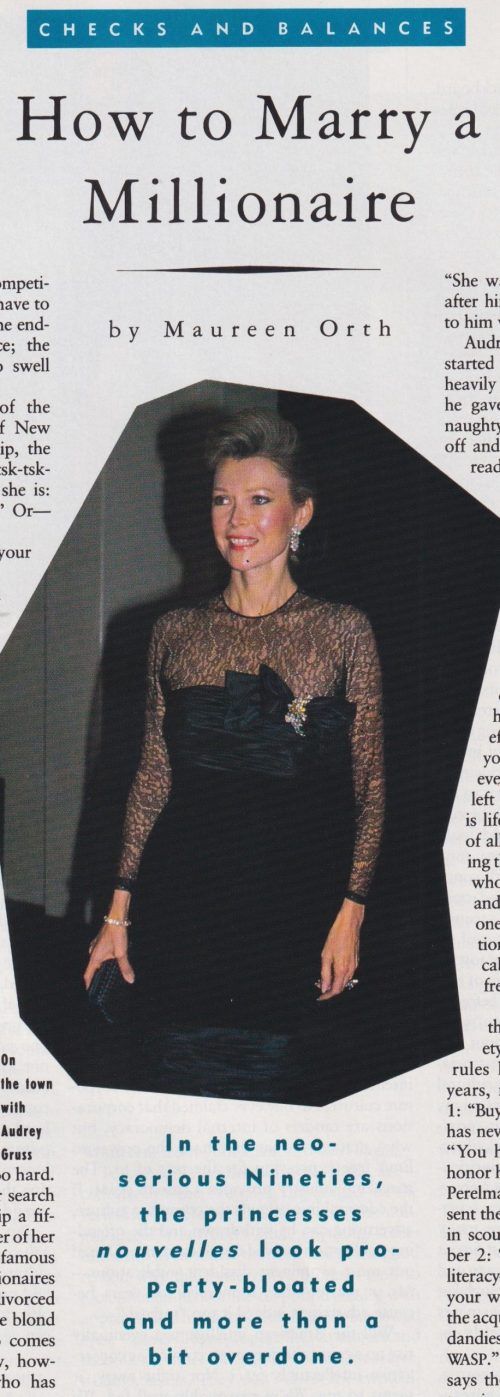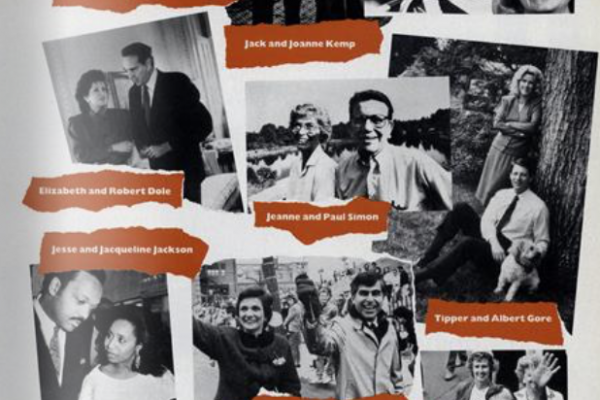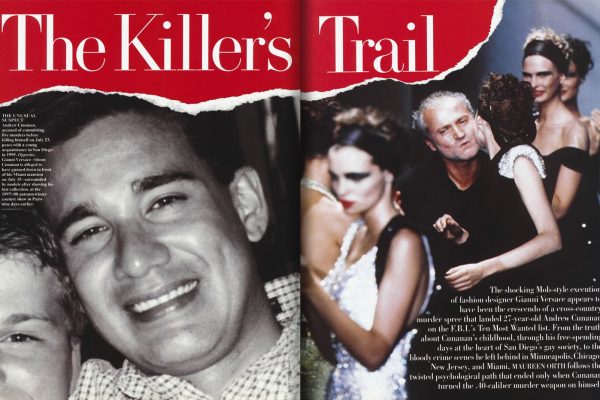Original Publication: New York Woman – February, 1990
The training is rigorous. The competition is Olympian, and the irony is you have to sleep with the prize. Don’t believe all the end-of-the-decade debunking of decadence; the lifestyle still rages. But is it really so swell to be a princess nouvelle?
Consider the hottest contestant of the moment in the social sweepstakes of New York, the object of the bitchiest gossip, the woman most likely to set of the tsk-tsk-tsk-ing tongues of “Who does she think she is: Ivana, Georgette, Carolyne, Gayfryd?” Or– gasp– another Susan Gutfreund?
Audrey Gruss, do you know what “friends” are saying about you?
Audrey is a very attractive mid-fortyish blonde who recently married her very own golden boy. Her new hubby, Martin Gruss, a less than scintillating financier, everyone says, was divorced by his first wife and left to languish with his millions, when Audrey crashed his midlife crisis and never let go. For years, it seems Audrey Butvay, a former cosmetics executive, has aspired to the select tribe that makes up the living theater of the ladies who consume.
But it isn’t so easy.
Despite fawning media coverage of these princesses, their performances really ought to be reported and rated on the sports and theater pages of the paper, not in the society columns. God knows they train hard enough and trash each other’s star turns more critically than Frank Rich has ever imagined. After listening to their peers– and having my ears fall off– I just have to assume that part of becoming a glam-ham wife of the newly very rich is to be able to hold your own among the knives of New York.
The greatest sin, it seems, is trying too hard. And Audrey is trying pretty hard. Her search for the special someone who could slip a fifteen-carat-emerald-cut on the third finger of her left hand took so long, she became famous among recently separated CEO millionaires stalking their status wives. “All those divorced finance guys are so grateful to get these blond hustlers,” says a friend of mine who comes from old New York money. “Audrey, however, is unreal.” Another woman who has watched the romance from the beginning says, “She was so worried someone else might be after him that she even rode her bicycle next to him while he was jogging.”
Audrey got her millionaire to lose weight, started choosing his clothes and pushed him heavily toward polo and Palm Beach. In return he gave her a Rolls-Royce Corniche (those naughty girls call it her “knish”). Now she’s off and climbing. Audrey’s decorator has already blabbed about Concorde tickets she sends him just to view a single piece of furniture in London. Old Money is appalled, not only by Audrey, but by the display laid on by the whole troupe of living theater wives. “You just sort of hope the day comes when they’re selling underwear at Bloomingdale’s again– but of course you know it never will.”
Hardly. In a set where envy and fear of losing your money predominate over having fun with it, and where every effect is calculated to the burn, you live your life making sure that if the black day ever comes when all is lost, at least you are left with your Taste intact. After all, what is life about anyway? What is the purpose of all these tutorials: adopting authors, hiring the correct florist, cultivating “walkers,” who escort you through upper-class life and tell you what to like? Having someone show you the gilded ropes of acquisition– a hautmentor, as the socially impeccable Jayne Wrightsman is to Susan Gutfreund– is standard practice.
If there’s one thing I’ve learned, it’s that the dough rises in junk bond society according to specific rules, even if the rules have all been made in the last few years, invented on the come. Rule number 1: “Buy Henry Kissinger,” says someone who has never made a wrong move on this circuit. “You hire him for your business and then honor him at some benefit.” (Claudia and Ron Perelman feted him at a Boy Scout lunch and sent the most adorable stuffed animals dressed in scout uniforms as invitations.) Rule number 2: “You must pick a theme – art, disease, literacy – and if you can’t immediately buy you way onto a board of a museum, get on an acquisition committee.” Some other handy dandies: “Invite Carter Burden. He is the pet WASP.” Or “Cultivate the press.” Everyone says the Great Dames “go crazy if their picture isn’t taken.” But you already knew that.
Unfortunately for Audrey and her aspirant friends, the century is becoming a bit long of tooth– the moment to have joined this select troupe was the mid-Eighties when corporate takeovers hadn’t gone sour and when greed was less egregious. (Look how Ron and Nancy’s trip to Japan gave it such a bad name. No wonder John Fairchild was forced to invent a new, not-for-such-decadent-consumption moniker– the “soft society.”) Now in the neo-serious Nineties these prancing prima donnas and their thinly veneered escorts look property-bloated and more than a bit overdone, with dresses, jewels, furniture and paintings than most Arab potentates could imagine.
Most amusing, but worst of all for Audrey, is that it’s not immediately apparent whether or not she has really Paid Her Dues. Has she knelt on the floor with pins in her teeth, the way Carolyne did for Oscar, learning everything at the feet of his late wife, Françoise? Even Karen Le-Frak, to atone for being the daughter-in-law of loudmouthed billionaire Sam Le-Frak, slaved in the archives of New York Philharmonic and got her masters in music history, to boot, to prove her refinement so she could rise in the symphony association and start giving her family’s money away. Audrey, it seems, has gotten her polo ponies out of the stable a little too early in a match that’s just a decade too late.
It all used to be so much simpler, but of course, the stakes were only seven or eight figures then. Now common charity work or a teensy little throwaway job is no longer enough. These days you must be both geisha and tycoon. Amid all this pressure and privilege, you must grit your teeth and fight the tears because even though your husband has backed you with his multimillions– a la Georgette’s cosmetics, Carolyne’s dresses. Ivana’s Plaza– your bottom line beckons. Wouldn’t it just be easier to open a boutique in Malibu the way rock wives do?
“Business is a way of justifying the lifestyle because you feel a certain amount of guilt– it’s obscene to spend this much money,” says an older beauty who moves among these women. “They all have this puritanical obligation to the work ethic. It’s as if they’re saying, ‘I want certain people to know this dress costs $24,000, but, after all, I’ve worked for it, I’ve earned it.’ It’s guilt, and guilt kills humor. They’re all so deadly serious.”
She must be kidding, Gaiety? Humor? Who can afford to think about fun and laughter– life’s rich pageant– when you’ve got to wonder every day whether you’ve picked the right themes for your life? What if you pick the wrong disease? What if Pat Buckley fails to view you as “legitimate”? What if Barbara Walters won’t come to your benefit? What if your business fails? Consider the icy slopes– you commit the cardinal sin of being pushy (as opposed to being ambitious, driven, workaholic) and you may end up socially busted and, just like poor Susan Gutfreund, banished.
“She was lambasted out of New York for making a complete fool out of herself, for being too aggressive, dropping these ridiculous French phrases all the time,” one socialite says of the world’s richest former stewardess. Gutfreund is married to the older chairman of Salomon Brothers, the mighty John H., who now must commute to their swank soirees in their grand hôtel particulier in Paris via the Concorde from New York. As le tout W readers are told in every issue, Susan has come into her own on the banks of the Seine. But other reports keep wafting back– no matter what W says about exquisite little gifts her chauffeur delivers with the dinner invites– that “what Jayne Wrightsman has tried to teach Susan just hasn’t stuck.” Is it true? Who knows in the brutal theater of consumption? Isn’t it time for the show to close? Or maybe Susan can try Warsaw next. God knows Basia Johnson has found happiness there.
This article is typed from the original material. Please excuse any errors that have escaped final proofreading.




No Comments